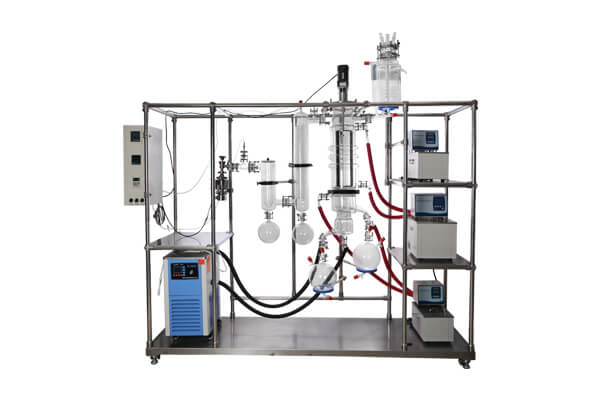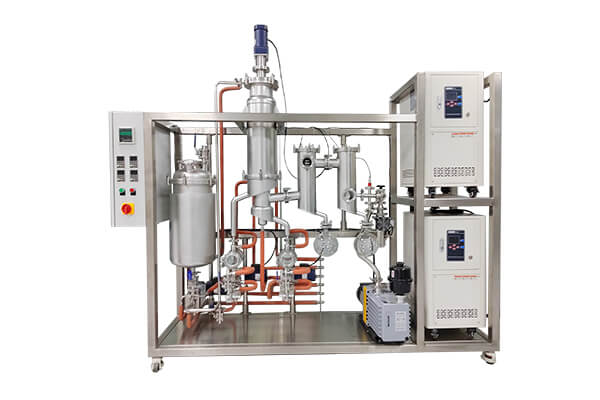What are the advantages of molecular distillation?
Efficient Separation
It efficiently separates components in a mixture based on their molecular size and polarity differences, ensuring high purity end products.
Low-Temperature Operation
Operating at relatively low temperatures, it suits temperature-sensitive compounds, preventing their decomposition or volatilization.
Control Flexibility
The process offers precise control by adjusting parameters like temperature, pressure, and flow rate.
Wide Applicability
It works for various mixtures, including liquid-liquid, liquid-solid, and liquid-gas mixtures.
Low Energy Consumption
Compared to traditional distillation techniques, molecular distillation generally requires less energy since it operates at lower temperatures and often at atmospheric pressure.
Versatility
Molecular distillation finds applications across industries like chemical engineering, pharmaceuticals, and food processing, catering to diverse separation needs.

Molecular Distillation(Glass model)
Molecular distillation is a specialized technique for separating substances with high boiling points, viscosity, or corrosiveness. It operates under reduced pressure, vaporizing molecules based on their properties such as molecular weight and polarity.
This process is commonly used in industries like chemicals and pharmaceuticals for purifying compounds and extracting active ingredients.
Molecular Distillation(Stainless steel model)
Rotate speed(r/min): 30-350
Stainless steel material: 304/316
Feeding method: Gear pump automatic continuous feeding
Discharge method: Gear pump automatic continuous discharge
Operating Temperature(℃): Within 350℃

Get a quote now!
What is the difference between molecular distillation and short path distillation?
Molecular Distillation:
Molecular Distillation stands out as a highly specialized technique primarily utilized for compounds with high boiling points, viscosity, or corrosiveness. This method relies heavily on the molecular weight and polarity of the substances being distilled. It involves delicate molecular interactions such as van der Waals forces and hydrogen bonding, along with molecular flow and diffusion.
Typically employed in separating highly volatile substances, Molecular Distillation finds applications in refining chemicals and purifying active ingredients from natural products. Operating under low pressure conditions helps minimize molecular collisions and losses on the apparatus walls.
Short Path Distillation:
Short Path Distillation, on the other hand, serves as an efficient method mainly used for separating temperature-sensitive or highly volatile substances like essential oils, solvents, and high-purity compounds. This technique rapidly heats the liquid, causing it to condense into distillate within a very short distance. This minimizes the residence time of the mixture in the apparatus, reducing the chances of thermal decomposition and unwanted reactions.
Widely employed in chemical manufacturing, pharmaceuticals, food processing, and the fragrance industry, Short Path Distillation aids in extracting or purifying high-value compounds.
